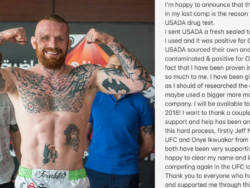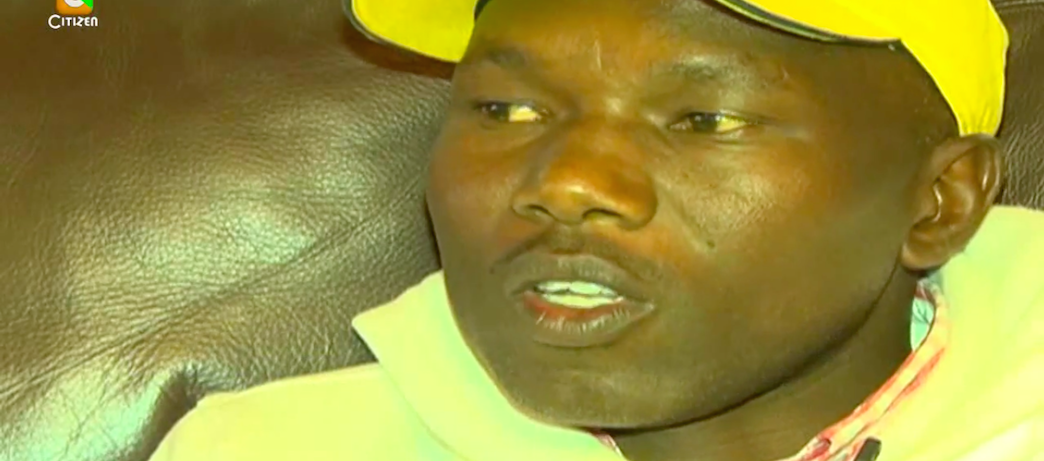The trouble with Ostarine: Jimmy Wallhead’s
16th March 2018
Features


A four-part documentary that aired on Kenya Citizen TV, Poisoned Spikes, has alleged that performance-enhancing drugs are still widely available in Kenya. This is despite efforts made to clean up Kenyan athletics after a number of positive tests followed a 2012 documentary for Germany’s ARD, which highlighted the same issue. The Kenyan documentary followed a three-year investigation, and included undercover operations to buy performance enhancing drugs from the Eldoret/Kapsabet region, as well as in the capital, Nairobi. It also features interviews with Athletics Kenya, and athletes who have doped.
“In 2012 Athletics Kenya’s President, Isaiah Kiplagat, was claiming that the evidence presented in ARD German TV was not based on real facts”, German investigative journalist Hajo Seppelt told the Sports Integrity Initiative. “In 2015 it looks like the situation is even worse than we believed three years ago. That Athletics Kenya was not aware of this is not credible.”
Part one of the programme interviewed Noah Busienei (pictured), estranged husband of Rita Jeptoo, who was issued with a two-year ban in February this year after testing positive for erythropoietin (EPO). He blamed both Athletics Kenya and Jeptoo’s Italian agent for her ban. “They gave us multivitamins”, says Busienei in the documentary (full video below). “They gave us some…I don’t understand what it was, but they said it would help us in training. He said it would give us water. If we want to go for a long run there is special water. I asked what is the special water for? He said the special water is good for our bodies. I have to blame two people, three people. Claudio [Claudio Baradelli, Jeptoo’s coach] and Federico [Federico Rosa, Jeptoo’s agent]. And also Athletics Kenya, because I spoke with them and they refused to take the information.”
In an April 2013 letter, Busienei alleged that Jeptoo had been doping since 2011 in an attempt to secure a financial settlement with Jeptoo by threatening to lodge a ‘doping dossier’ with the World Anti-Doping Agency (WADA). Agence France Presse confirmed the letter was authentic by contacting Busienei’s lawyer.
Jeptoo claimed that her positive may have been caused by substances administered to her after a road accident. A similar claim was also made by Mathew Kisorio, who recently completed a 2012 two-year ban after testing positive for steroids. “I went to see the doctor, introduced myself and we soon became friends”, he told the documentary. “He gave me something and told me it would help me train better and make my muscles stronger. He then injected me and I have no idea what the substance was. Soon after, I attended the national athletics trials in my captaincy as a Policeman. I received a call one month later from Athletics Kenya alerting me that I had failed a blood test at that event. I took my brother and a friend to the doctor and told him to help them perform better. We wanted to get the exact sample that he had given me previously. During the course of our consultation, police arrived and took the medicine. The drugs were taken to Athletics Kenya and from that day, I don’t know what happened. I have never heard back from them regarding the drugs or the doctor.”
Athletics Kenya (AK) is conducting its own investigation into the allegations, and earlier this week suspended two foreign athlete management companies that deal with Kenyan athletes. ““Kisorio himself has not come forward”, Kiplagat told the documentary. “We have called him here to write a statement and to give us the name of the doctor. He has completely evaded us. What he has mentioned is that yes, many athletes go there. He has mentioned the names of a few athletes.”
However, a doctor who had treated Kisorio told the documentary makers that he had been in contact with Athletics Kenya. “We had an issue, but we cleared it with the police”, said Dr. Too. “He actually came in for treatment. He had been treated in Nairobi and in Kapsabet. So when he came here, he said he wanted treatment. That is what we did and we gave him medication. All the information regarding the drugs that we prescribed to Kisorio is with Athletics Kenya.”
Under cover on anonymity, a professional athlete confirmed that doctors and management are encouraging athletes to dope. “I have heard these stories and, truly, these boys are being lied to”, said the unnamed athlete. “They are using drugs and indeed I know you can find drugs in Kapsabet. My friend told me that there are specific drugs that can help me run well. I asked if it would affect me? He told me yes, and warned not to take too much. Just use a little so that you can get some energy. I tried and I ran well, but it affected me later on and I felt like my knees had no more strength.”
The documentary makers showed how easy it is to get drugs directly from chemists in the region. Stage one involved going to the Baraton University hospital to ask for haemoglobin measurements. Stage two involved going to Kapsabet Town, where a pharmacist had agreed to supply EPO. A first pharmacist insisted on injecting EPO directly leading undercover agents to pull out, however a second pharmacist agreed to supply the drug. The documentary makers also paid a visit to the same Nairobi store that had supplied investigative journalist Hajo Seppelt with EPO during his 2012 investigation into Kenyan doping. The pharmacist denied supplying EPO, but suggested to documentary makers that they went to other chemists in the capital, who “will show you EPO”.
Kiplagat admitted that tackling the issue is difficult, suggesting that the only way to solve the issue would be to stop doctors and chemists supplying the drugs. “It’s a big business, because what we’re being told is that if you win, you might get $100,000 or so, then 20% goes to the doctor”, he said. “If you arrest one doctor, or close two chemists, then I can tell you that people will be moving. Nobody will want to do it.”
The Eldoret/Kapsabet region, at 2,100 metres above sea level, is the gateway city to high-altitude training in surrounding Kenyan villages. Over a sustained period, altitude training is thought to benefit athletes as lower oxygen levels mean that the body increases red blood cell and haemoglobin production. This aids the blood in carrying oxygen to the muscles, a benefit that remains for 10-14 days when the athlete returns to lower altitude.A number of endurance athletes have trained in this area – including Britain’s Mo Farrah ahead of the London 2012 Olympics. The Estonian athletics association (EKJL) suspended Nikolai Vedehin at the end of March, after the 1,500m national champion tested positive for Trimetazidine after a 5 February 2015 out-of-competition test conducted in Eldoret.
When questioned by the Sports Integrity Initiative, WADA said it is possible that historic samples from athletes that have trained in Kenya could be retested. “This is a possibility but first, full evidence must be obtained”, said a spokesperson. “Athletes’ samples would also be the responsibility of the relevant anti-doping organisation (for instance, the IAAF).”
Three times International Association of Athletics Federation (IAAF) champion, Moses Kiptanui, told the documentary that uncertainty over doping is already affecting racing, as event organisers are pulling out through fear that athletes may test positive. He called on the Kenyan government to investigate the situation.
“This new Kenyan documentary corroborates and adds to many of the findings from the 2012 German documentary which alleged that unethical doctors were providing doping substances to athletes”, said WADA Director General, David Howman, in a statement. “This is of concern to WADA and the broader anti-doping community.” In February, WADA signed a partnership agreement with Anti-Doping Norway (ADN), the China Anti-Doping Agency (CHINADA), the Anti-Doping Agency of Kenya (ADAK), and the Ministry of Sports, Culture and the Arts, Kenya, in an effort to provide a project plan to develop an effective anti-doping program for Kenya and the countries within the Zone V RADO (an African Regional Anti-Doping Organisation). It said that it would discuss the documentary with the Task Force and with the forthcoming RADO meeting in Nairobi.
• Eleven athletes (and a horse trainer) from eleven countries, competing in nine sports, were...
• 20 athletes from nine countries, competing in ten sports, were involved in anti-doping proceedings...
• Twenty four athletes from 13 countries, competing in eight sports, were involved in anti-doping...